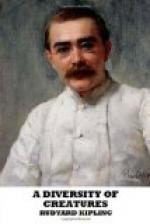’The boy in the knickerbockers, languishing on a chair, puts in a claim for one drink. “Let him go dry,” says our friend in shirt-tails. “He’s a reporter. He run into me on his filthy bicycle and he asked me if I could furnish ’im with particulars about the mutiny in the Army. You false-’earted proletarian publicist,” he says, shakin’ his finger at ’im—for he was reelly annoyed—“I’ll teach you to defile what you can’t comprebend! When my regiment’s in a state o’ mutiny, I’ll do myself the honour of informing you personally. You particularly ignorant and very narsty little man,” he says, “you’re no better than a dhobi’s donkey! If there wasn’t dirty linen to wash, you’d starve,” he says, “and why I haven’t drowned you will be the lastin’ regret of my life.”
’Well, we sat with ’em and ’ad drinks for about half-an-hour in front of the Mess tent. He’d ha’ killed the reporter if there hadn’t been witnesses, and the reporter might have taken notes of the battle; so we acted as two-way buffers, in a sense. I don’t hold with the Press mingling up with Service matters. They draw false conclusions. Now, mark you, at a moderate estimate, there were seven thousand men in the fighting line, half of ’em hurt in their professional feelings, an’ the other half rubbin’ in the liniment, as you might say. All due to Persimmon! If you ’adn’t seen it you wouldn’t ’ave believed it. And yet, mark you, not one single unit of ’em even resorted to his belt. They confined themselves to natural producks—hands and the wurzels. I thought Jules was havin’ fits, till it trarnspired the same thought had impressed him in the French language. He called it incroyable, I believe. Seven thousand men, with seven thousand rifles, belts, and bayonets, in a violently agitated condition, and not a ungenteel blow struck from first to last. The old gentleman drew our attention to it as well. It was quite noticeable.
‘Lack of ammunition was the primerry cause of the battle ceasin’. A Brigade-Major came in, wipin’ his nose on both cuffs, and sayin’ he ’ad ‘ad snuff. The brigadier-uncle followed. He was, so to speak, sneezin’. We thought it best to shift our moorings without attractin’ attention; so we shifted. They ’ad called the cows ’ome by then. The Junior Service was going to bye-bye all round us, as happy as the ship’s monkey when he’s been playin’ with the paints, and Lootenant Morshed and Jules kept bowin’ to port and starboard of the superstructure, acknowledgin’ the unstinted applause which the multitude would ’ave given ’em if they’d known the facts. On the other ’and, as your Mr. Leggatt observed, they might ’ave killed us.
’That would have been about five bells in the middle watch, say half-past two. A well-spent evening. There was but little to be gained by entering Portsmouth at that hour, so we turned off on the grass (this was after we had found a road under us), and we cast anchors out at the stern and prayed for the day.




